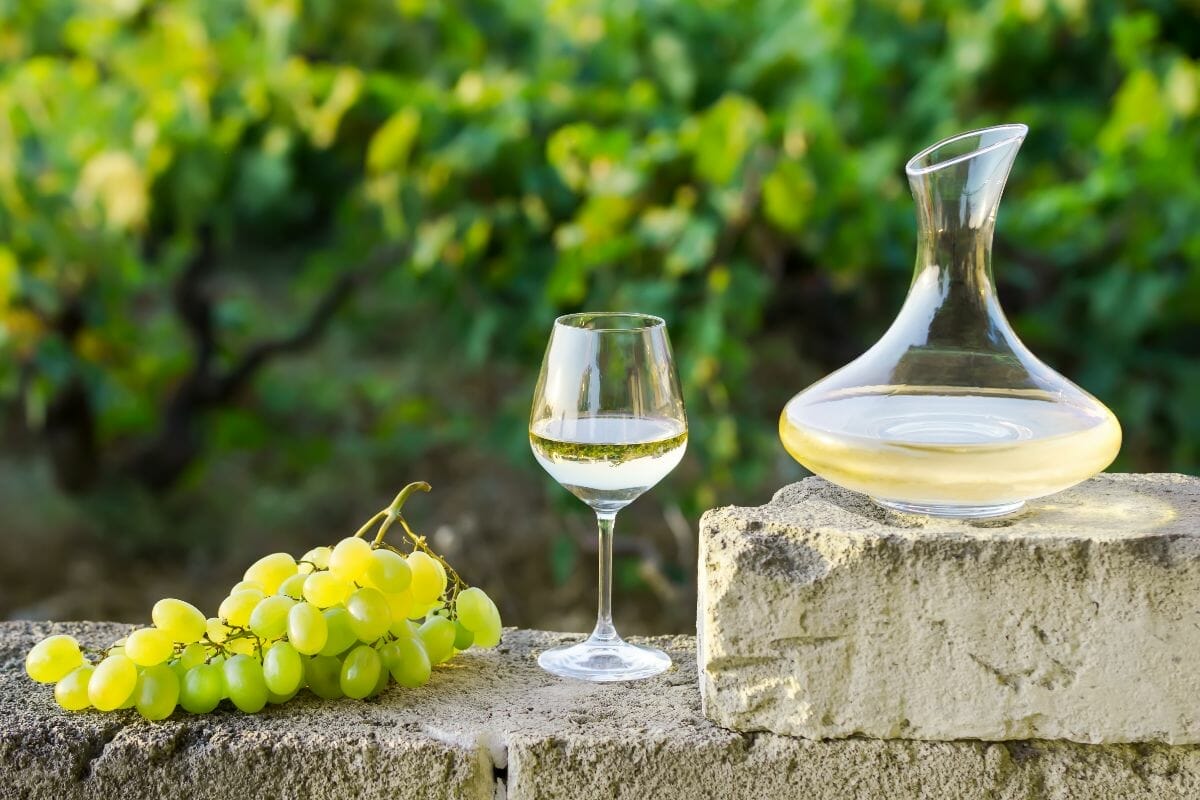Decanting wine is a process that involves pouring the wine from one container to another. The technique has been practiced for centuries as it has two main purposes.
The first is that it prevents natural sediments from affecting your glass. The second is that the wine aerates and opens its bouquet before people drink it.

Many decanters have a nice shape and appearance, so the decanting method can have an aesthetic effect as well.
Merely transferring wine into a decanter from its bottle has some effects, but decanting involves more than just this step.
We’ll cover more about decanting and storing wine in this post, including why decanting is important, how to decant wine correctly, and how long you should decant your wine for.
Why Is Decanting Wine Important?
Decanting wine has several advantages. As mentioned above, the process helps separate the wine’s sediment from the beverage.
This is ideal for red wines as they contain a lot of sediment. Decanting can also improve a wine’s flavor by letting it come into contact with air, so the wine can ‘breathe’.
Wine usually spends lots of time inside its bottle, so they don’t touch oxygen. Aeration is important as it frees the distinct flavors and aromas in the wine.
This releases any built-up gases and balances the tannins.
Despite its advantages, remember that an excess of oxygen can damage nice wine. Limit how much air exposure the wine receives and keep the drink cool.
How To Decant Wine Correctly
Decanting wine isn’t a hard process, but it will require patience as it takes a while.
Follow these steps to decant wine properly:
- Begin by leaving your wine bottle upright for a minimum of 24 hours before you decant it, particularly if you store your bottles horizontally. Check that the sediment lies at the bottom of the wine bottle before the next step.
- Open the wine bottle and gradually tilt it close to the decanter. Leave the bottom of the wine bottle low to stop its sediment from traveling to the bottleneck.
- Start to slowly pour the wine inside the decanter. Work at a steady, gradual pace. Stop pouring if you notice the sediment traveling to the top, and move the bottle upright so it begins to settle once more.
- Remember to re-cork any remaining wine after a maximum of 18 hours.
A tip to prevent sediment from falling inside the decanter is to leave a small amount of liquid inside the wine bottle.
You can decant wine a few hours before drinking it but remember that wines all have different decanting periods.
You’re unlikely to spoil oxidized wine if you enjoy it after a maximum of four hours, but you should consider the kind of wine you’re working with.
Can You Over-Decant Wine?
Wines don’t start deteriorating if you drink them a few hours after decanting them, but there are some varieties you should take care of.
- White Wine: White wines contain more thiols compared to red. If they are decanted too much, this may affect their passionfruit, guava, and grapefruit notes.
- Vintage Wine: A few vintage wines are sensitive, so they can deteriorate fast once you’ve opened them.
- Sparkling Wine: You won’t normally need to decant sparkling wines, but some may have a distinct fragrance that needs to air out before you drink it.

What Types Of Wine Need Decanting?
Practically all types of wine can improve with decanting.
Aerating the wines helps them taste fruitier and more pleasant. Oxygenation can also help improve the taste of younger wines that contain a lot of distinct tannins.
As mentioned above, you won’t need to decant sparkling wine.
Aeration may help balance out some of the harsh bubbles from initially opening Champagne, but if you’re not careful, you can lose all of the wine’s bubbles that add to its charm.
How Long To Decant Wine
It’s important to know how long your should air your wine out before you begin decanting it. Here’s a breakdown of different wine varieties and how long to decant them for.
Red Wine
Red wine tends to take between 20 minutes and two hours to turn into its best after decanting.
Lighter-bodied examples won’t need as much time, only 20-30 minutes. These include:
- Pinot Noir
- Grenache
- Gamay
- Zinfandel
Medium-bodied red wine will need longer, between 20 minutes and an hour. These include:
- Barbera
- Cabernet Franc
- Malbec
- Merlot
- Tempranillo
Full-bodied bottles of red wine will need even longer, between 1 and 2 hours to decant fully. Common examples include:
- Petit Sirah
- Nebbiolo
- Monastrell
- Cabernet Sauvignon
In most cases, red wine will need a minimum of 15 minutes to remove its less attractive features.
Once this has passed, an additional 15-30 minutes will help balance out any residual sharp fragrances. After 60 minutes, the wine’s tannins will neutralize and won’t be as powerful.
Rosé And White Wine
Rosé and white wine doesn’t often need to be decanted, but it can help if the wine has reduced.
If your white or rosé wine smells unusual after opening, this is usually the result of reduction. This occurs when a wine’s fragrant elements haven’t come into contact with oxygen for a while.
You can notice if a wine is reduced if it smells like burnt rubber, rotten eggs, or garlic.
If you do want to decant reduced rosé or white wine, 15 minutes is sufficient, but they shouldn’t need more than 30 minutes.
How To Accelerate The Decanting Procedure
Decanting can take a while, but here are some tips to help you speed up the process:
- Try pouring your wine between two different decanters one or two times. You can do this from the original wine bottle, but you may want to use a funnel to avoid wine spills.
- Swish the wine around in your decanter to improve the liquid’s aeration.
- Buy a specific wine aerator. Several aerators can help improve the way your wine tastes.
Final Thoughts
Decanting wine helps remove any sediment from the drink and helps the wine breathe, improving its flavor in the process.
Decanting is normally saved for red wine, but if your rosé or white wine has reduced, decanting can remove any unwelcome smells.
Remember to check how long your type of wine needs to decant before you start, as some varieties need less time than others.
- Moscato vs Roscato: A Comprehensive Comparison of Sweet Wines - December 15, 2023
- Should White Wine Be Chilled? Expert Insights on Serving Temperature - December 14, 2023
- Moscato vs Riesling: A Sweet Wine Showdown - December 8, 2023










